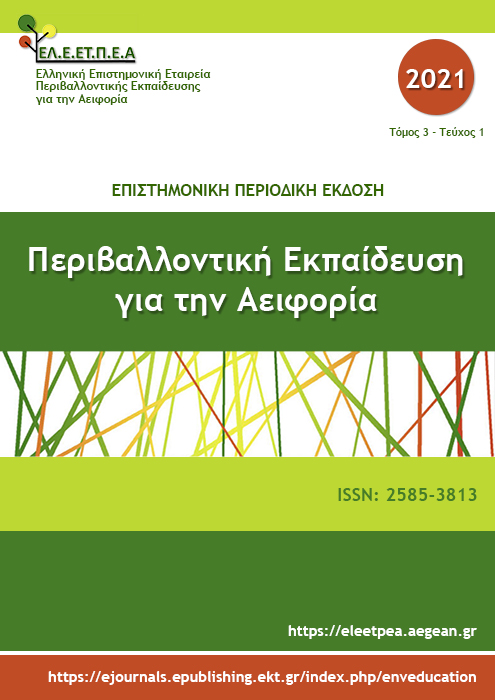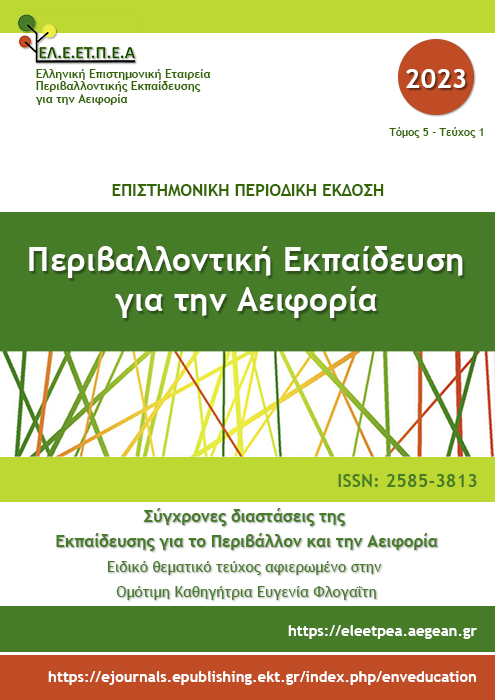Περιβαλλοντικά υπεύθυνη συμπεριφορά στο χώρο εργασίας. Μια προσέγγιση του ρόλου της διεύθυνσης και του εργασιακού κλίματος

Περίληψη
Μεγάλο μέρος του χρόνου μας αναλώνεται στο χώρο εργασίας με πολλές από τις επαγγελματικές μας δραστηριότητες να έχουν επιπτώσεις στο περιβάλλον. Είναι επομένως αναγκαία η υιοθέτηση περιβαλλοντικά υπεύθυνης επαγγελματικής συμπεριφοράς (ΠΥΕΣ), για την αντιμετώπιση ζητημάτων που αφορούν το περιβάλλον και την αειφόρο ανάπτυξη. Η υιοθέτηση ΠΥΕΣ δεν εξαρτάται μόνο από την περιβαλλοντικά υπεύθυνη συμπεριφορά (ΠΥΣ) των ατόμων αλλά και από τις συνθήκες στο χώρο εργασίας, σε επίπεδο εταιρικής πολιτικής και ενδο-εταιρικής κουλτούρας. Συνεπώς, επηρεάζεται από σειρά παραγόντων που την ενθαρρύνουν ή την εμποδίζουν, οι οποίοι ρυθμίζονται από τη Διοίκηση μιας εταιρίας. Η παρούσα εργασία μελετά τις αντιλήψεις εργοδοτουμένων σε πράσινους χώρους εργασίας [και μη] και διευθυντικών στελεχών, γύρω από τους παράγοντες και το ρόλο των διευθυντών στην ενίσχυση της ΠΥΕΣ στο χώρο εργασίας. Τα αποτελέσματα καταδεικνύουν ότι η σημασία του ρόλου της διεύθυνσης εντοπίζεται στο παράδειγμα που αυτή θέτει, στο εργασιακό κλίμα που δημιουργεί, στην ενσωμάτωση φιλοπεριβαλλοντικών πρακτικών, στις διαδικασίες και τα πρωτόκολλα εργασίας, την παροχή κινήτρων, καθώς και τη σημασία που αυτή αποδίδει στην εκπαίδευση σε θέματα περιβάλλοντος και αειφορίας στα πλαίσια της επαγγελματικής εκπαίδευσης-κατάρτισης. Οι ερευνητές συζητούν τα αποτελέσματα και προτείνουν μέτρα καλής πρακτικής για την γεφύρωση της απόστασης μεταξύ της πρόθεσης και της εκδήλωσης ΠΥΕΣ.
Λεπτομέρειες άρθρου
- Πώς να δημιουργήσετε Αναφορές
-
Περατικός Α., & Κάτζη Χ. (2021). Περιβαλλοντικά υπεύθυνη συμπεριφορά στο χώρο εργασίας. Μια προσέγγιση του ρόλου της διεύθυνσης και του εργασιακού κλίματος. Περιβαλλοντική Εκπαίδευση για την Αειφορία, 3(1), 1–16. https://doi.org/10.12681/ees.25231
- Ενότητα
- Articles

Αυτή η εργασία είναι αδειοδοτημένη υπό το CC Αναφορά Δημιουργού – Μη Εμπορική Χρήση – Παρόμοια Διανομή 4.0.
Οι συγγραφείς διατηρούν τα πνευματικά δικαιώματα και παρέχουν στο περιοδικό το δικαίωμα της πρώτης δημοσίευσης μαζί με την αδειοδότηση της εργασίας με CC-BY-NC-SA, που επιτρέπει σε άλλους να μοιράζονται αυτή την εργασία με αναγνώριση του συγγραφικού δικαιώματος και την αρχική δημοσίευση σε αυτό το περιοδικό.


